Is it possible to eat watermelon seeds and how are they beneficial for the body?
Watermelon seeds are usually not eaten. However, in Asian countries they are popular and sold as a separate product, like sunflower or pumpkin seeds in our country. It's all about their taste and benefits.
Today you will find out whether you can eat watermelon seeds and why they are so beneficial for the body.
Watermelon seeds
Let's take a closer look at what is included in watermelon seeds (per 100 g of product).
Vitamins:
- thiamine, B1 – 0.2 mg;
- riboflavin, B2 – 0.15 mg;
- nicotinic acid, B3 – 0.35 mg;
- pantothenic acid, B5 – 0.34 mg;
- pyridoxine, B6 – 0.09 mg;
- folic acid, B9 – 0.06 mg.
Macronutrients:
- phosphorus – 750 mg;
- calcium – 55 mg;
- potassium – 650 mg;
- magnesium – 514 mg;
- sodium – 100 mg.
Microelements:
- iron – 7.3 mg;
- manganese – 1.62 mg;
- copper – 0.69 mg;
- zinc – 7.3 mg.
B vitamins are necessary to normalize the functioning of the nervous and cardiovascular systems. They strengthen the immune system, participate in cell growth, increase stress resistance and regulate intestinal function.
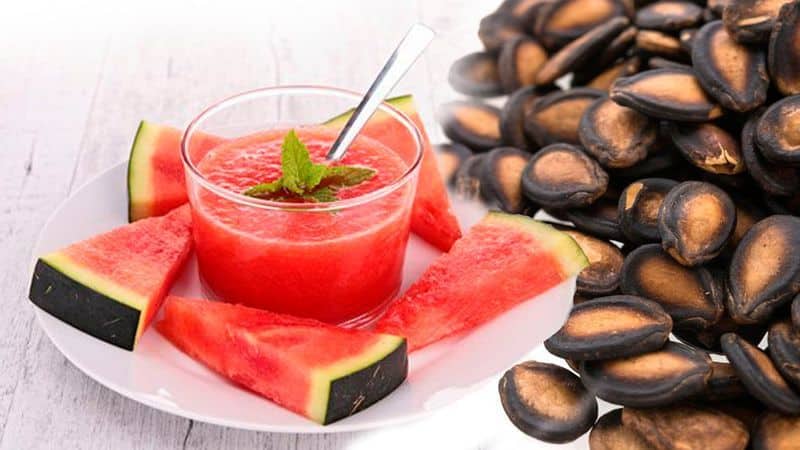 Watermelon seeds contain arginine, which normalizes blood pressure, reduces the risk of heart attacks and cardiovascular diseases, and accelerates the regeneration of muscle cells.
Watermelon seeds contain arginine, which normalizes blood pressure, reduces the risk of heart attacks and cardiovascular diseases, and accelerates the regeneration of muscle cells.
In addition to arginine, there are other amino acids: tryptophan, lysine, oleic, linoleic and glutamic acids. Lysine has a positive effect on mental abilities, so it is useful for severe stress on the brain.
The product contains many antioxidants and lycopene.The latter is necessary for the prevention of cancer.
Semi-fiber, or the fibrous component, regulates the functioning of the digestive tract, normalizes stool and removes waste and toxins.
Monosaturated and polyunsaturated fats lower cholesterol levels.
Citrulline normalizes blood sugar and prevents anemia.
Energy value and BZHU
In 100 g of product:
- proteins – 28.33 g;
- fat – 47.37 g (10 of which are saturated);
- carbohydrates – 15.31 g;
- calorie content – 601 kcal.
Is it possible to eat watermelon seeds?
Inflammation of the appendix from swallowing watermelon seeds is a long-debunked myth. In the absence of contraindications and the habit of abusing them, eating them is not only possible, but also useful.
Benefits and harms
Like any food, watermelon seeds can cause allergies, which will lead to skin rashes, runny nose and enlarged nasopharyngeal mucosa.
If consumed in excess, ammonia damages the kidneys. Ammonia is released when the citrulline found in watermelon is processed. Once inside, it breaks down and releases toxic ammonia. Coming out with urine, it irritates tissues.
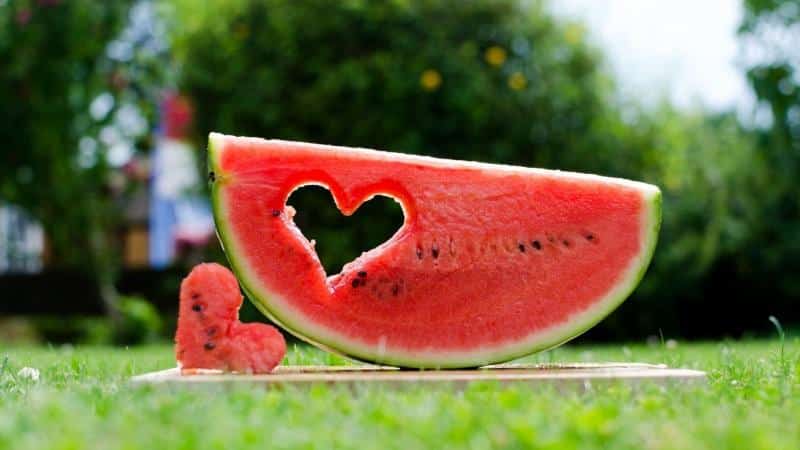 Otherwise, due to the content of a large number of vitamins and microelements, watermelon seeds improve overall well-being and can even have a therapeutic effect on the body’s condition.
Otherwise, due to the content of a large number of vitamins and microelements, watermelon seeds improve overall well-being and can even have a therapeutic effect on the body’s condition.
Effect of the product on organs and internal systems:
- help remove uric acid, prevent the formation of sand and kidney stones;
- have antifungal and anti-inflammatory effects;
- promote healing of burns and wounds;
- speed up metabolism;
- have a positive effect on the condition of the eyes;
- have vasodilating properties;
- promote the removal of excess bile, which serves to prevent the occurrence of gallstones;
- prevent the death of pancreatic cells.
Healing properties for various diseases
For influenza and ARVI, it is recommended to ingest watermelon powder mixed with water or watermelon tea. Full of vitamins and microelements, tea or infusion will support the immune system and the functioning of internal organs, and speed up recovery.
Watermelon oil helps get rid of stomach ulcers and internal inflammation, and helps eliminate constipation.
Seeds work and how anthelmintic means. They are added to the composition raw, dried or in the form of oil.
The presence of a large amount of valuable vitamins helps with vitamin deficiency, chronic fatigue syndrome, insomnia and depression.
Watermelon seeds normalize blood sugar and increase insulin levels, which is important for patients with diabetes.
They can also have an analgesic effect. They are used for alcohol poisoning, swelling, diarrhea and gonorrhea.
Benefits for males and females
Watermelon seeds support prostate function and prevent the development of prostate adenoma, which is important for men. If there are symptoms of erectile dysfunction, they help eliminate them.
One of the properties of watermelon seeds is to improve the functioning of the reproductive system, both male and female. Thanks to them, libido increases.
Correct usage
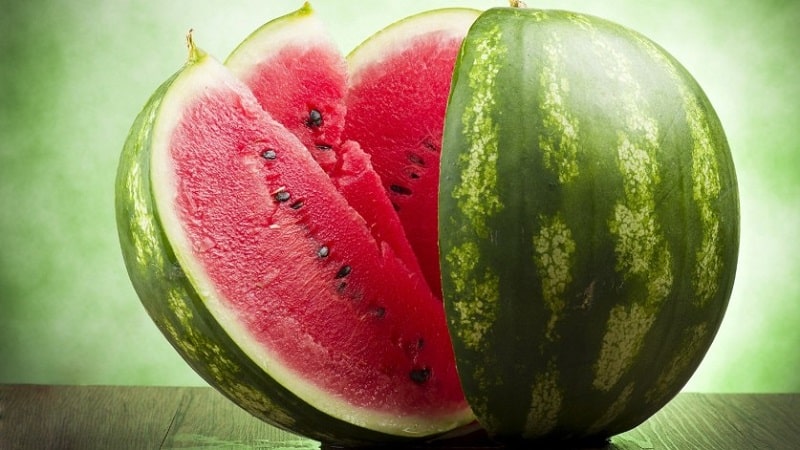
Most of the useful elements are contained under the outer shell. The acidity of the stomach is not strong enough to break it down, so before eating, the seeds should be peeled or chewed thoroughly before swallowing.
Like sunflower seeds, watermelon seeds should be roasted.Once fried, they open easily and the inside can be chewed.
How to fry seeds
For frying you will need:
- ripe watermelon seeds, preferably large – 1 cup;
- salt – 1 teaspoon;
- water – 0.5 cups.
Important! To prevent the seeds from burning during frying, wash them first.
Frying order:
- Place the seeds in a hot frying pan and fry over medium heat, stirring with a spatula.
- When the seeds begin to crackle, add water and salt.
- Remember to stir, fry until dry.
Oven cooking procedure:
- Preheat the oven to 160°C.
- Cover a baking tray with baking paper and arrange the washed and dried seeds.
- Place the pan in the oven for 15 minutes.
Important! If you want the seeds to be crispier, bake them in the oven for an additional 2-3 minutes.
If desired, add seasonings to the roasted seeds. Hot peppers or lime juice, olive oil and salt work well for this.
If you want sweet seeds, add sugar, a pinch of vanilla or cinnamon. Experiment!
How much and how often can you eat
There is no need to consume watermelon seeds in large quantities. They have high energy value, so there is a risk of developing obesity.
The average dose for an adult is 2 tablespoons of peeled seeds per day.
Important! Due to the citrulline contained in the seeds, their abuse can lead to problems of the genitourinary system.
Other Applications
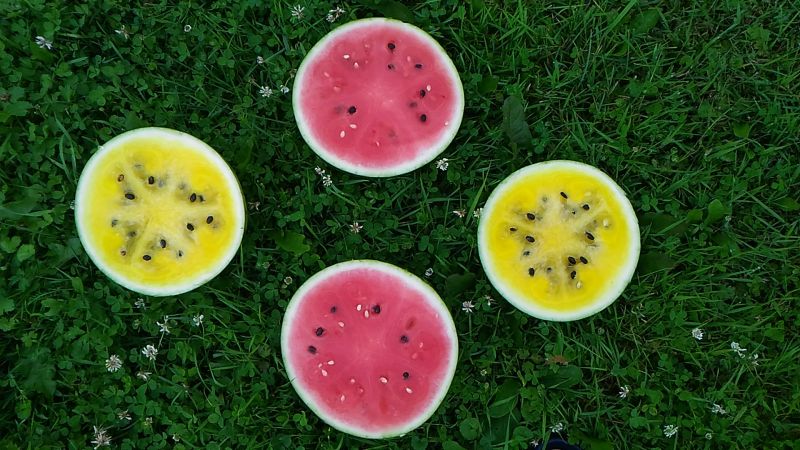
Eating watermelon seeds raw or fried can harm people with gastrointestinal diseases. There are other options for them to get benefits from seeds.
Watermelon seed tea
For tea you will need boiling water and watermelon seeds.
Procedure for preparing watermelon tea:
- Brew 4 tablespoons of seeds in 2 liters of boiling water.
- Leave the tea covered and toweled until it cools to room temperature.
- Strain the resulting broth.
Important! It is not recommended to add sugar to watermelon tea. You can sweeten it with chopped watermelon pulp or honey.
The resulting decoction has a diuretic effect. With its help, they cleanse the kidneys, treat urinary system infections and remove excess fluid.
Drink this tea up to 4 times a day.
Oil
How to make watermelon oil? Place washed and dried watermelon seeds into a glass container and fill with vegetable oil. Leave for about 3 weeks, then strain.
Another way to save waiting time: put the seeds under a press and squeeze out the oil.
Drink 1 teaspoon of oil in the morning, preferably no later than half an hour before your first meal. When treating kidneys - up to 4 times a day, 1 teaspoon. To combat acne - half a teaspoon up to 6 times a day. For hair loss - 1 teaspoon twice a day.
Important! You should not drink the oil with water, especially if you are using it to eliminate problems of the genitourinary system.
Watermelon oil is suitable as an alternative to other oils for dishes without heat treatment, such as salads or cold appetizers.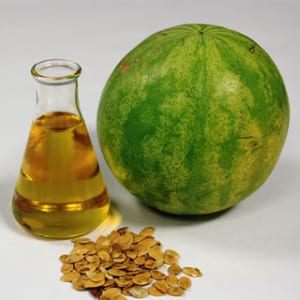
It is also used as a cosmetic product. Full of vitamins, it moisturizes, restores, nourishes, protects and prevents skin aging. Eliminates excess oil without drying out even sensitive skin. Watermelon oil is used to prevent and prevent skin cancer. It promotes the disappearance of acne and helps heal skin damage.
One option for cosmetic use is to add watermelon oil to shower gel, shampoo or any skin or hair care product. An approximate dose is 10% watermelon oil of the total volume of the product.
Watermelon oil will nourish and moisturize your hair, help restore your nails’ beauty and accelerate their further growth.
Watermelon oil is also suitable for caring for children's skin.
Read also:
The harm and benefits of pumpkin seeds for men.
Sprouted seeds
During the germination process, the substances contained inside the seeds transform into easily digestible states. The gastrointestinal tract requires much less internal energy to absorb useful food from sprouts.
Until the sprouts are rooted in the ground, they feed on sunlight and water. It is at this moment that they reach the peak of their internal energy potential.
If you decide to get the maximum available benefits from watermelon seeds, germinate them.
Seed germination procedure:
- Scarify, that is, damage the outer shell of the seeds. This way they will germinate faster.
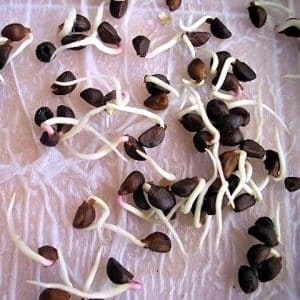
- Next, you should warm the seeds. Place them in a deep container and fill with warm water. The water temperature should be around 50 °C. After half an hour, drain the water. Warming up will ensure that sprouts appear quickly.
- To soften the outer shell of the seeds, soak them in hot water for 10 minutes.
- Make a kind of bag out of gauze folded several times, moisten it with water and put the seeds there. If possible, do not place them closer to each other than half a centimeter.
- Place the gauze bag in a shallow container. To optimize the environment and retain moisture, cover with clear film.
- Place the container in a warm place with enough sunlight.
- Watermelon seeds take a long time to germinate - you will see the sprouts hatching only after a week. During this time, if necessary, moisten the gauze with water at room temperature and do not allow it to dry out.
Watermelon sprouts can be consumed in any form and combined with any food. And again - experiment!
For whom are they contraindicated?
Don't forget that the rind and seeds of watermelon contain citrulline. Those who have kidney disease, urolithiasis or colitis are contraindicated from using citrulline, which is harmful to them, which can provoke an increase in symptoms.
Patients with citrullinemia should not consume any components of watermelon. This disease occurs in newborns, so pregnant women should consume watermelons with great caution.
Conclusion
Full of essential vitamins and elements and with beneficial properties, watermelon seeds help with various diseases and help relieve symptoms.
Moderate consumption of watermelon seeds has a positive effect on health. There is no need to throw it away, because there are many options for how to prepare and use them for the benefit of the body.